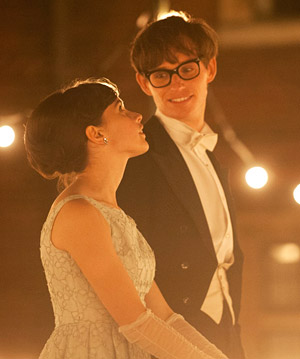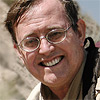
Benedict Cumberbatch, left, portrays Alan Turing in The Imitation Game (Image: STUDIOCANAL); Eddie Redmayne, right, stars as Stephen Hawking in The Theory of Everything (Image: Liam Daniel / Focus Features)
A review of two new movies: the Stephen Hawking biography The Theory of Everything, and the Alan Turing biography The Imitation Game.
2014 has been a relatively good year for science in the public eye. At the beginning of the year, we had Bill Nye’s victory over creationist Ken Ham, and two outstanding TV series, Neil DeGrasse Tyson’s Cosmos, and Neil Shubin’s Your Inner Fish. In all three cases, leading American popularizers of science managed to get a lot of publicity for good science. They also were successful in striking blows against various forms of pseudoscience, which are still pervasive in the media (especially on basic cable channels like Discovery and TLC, which ran “fake-umentaries” this year about living gigantic sharks, living mermaids, killer yetis, and even a guy promising to let an anaconda swallow him—then reneging). Now the year is coming to an end with two outstanding biopics about two of the most brilliant British mathematicians and scientists of the mid-late twentieth century, cosmologist Stephen Hawking (The Theory of Everything), and mathematician/cryptanalyst/computer pioneer Alan Turing (The Imitation Game). In both cases, the movies are outstanding, not only in their acting, writing, directing, and cinematography, but especially their relatively accurate and sympathetic portrayal of science and scientists, with all its struggles and triumphs.
Hawking’s Story

Felicity Jones stars as Jane Wilde and Eddie Redmayne stars as Stephen Hawking in Academy Award winner James Marsh’s The Theory of Everything, a Focus Features release. (Image: Liam Daniel / Focus Features)
The Hawking biopic, The Theory of Everything, focuses mostly on the early part of Hawking’s life, when he went from an awkward but brilliant mathematician and physicist who was still physically fit, to the gradual deterioration of his body due to the effects of ALS (amyotrophic lateral sclerosis, also known as Lou Gehrig’s disease after the famous New York Yankee who died from it). We see his early beginnings as a brilliant but socially awkward and isolated youth who quickly discovers his enormous talent for maths and physics. He is earning his doctorate when the first symptoms strike. He manages to woo his wife Jane before he becomes an invalid, and most of the movie is devoted to his deteriorating condition, and the huge burden it placed on his wife and family. Your heart goes out to this genius imprisoned by paralysis, and you find yourself trying to reach out and help him as he becomes more and more helpless. He eventually becomes unable to communicate the brilliant ideas that were running through his head until a voice synthesizer and computer are fitted to his wheelchair. The script is a bit light on the scientific side of the story, and I would like to have seen a bit more explanation of what kind of science they were pioneering and why it was so significant, but that is to be expected for a movie that is aimed at a popular audience which assumes no knowledge of science. (Tyson’s Cosmos, by contrast, managed to explain a lot of science without losing the same audience). The movie ends on a positive note, with Hawking receiving honors from the Queen herself, and reconciled with Jane after their divorce, even as he is reduced to controlling his wheelchair and his voice synthesizer by his eye muscles.
Turing’s Tale
The Turing movie, The Imitation Game, on the other hand, is very different in tone. Turing was another isolated genius, always the smartest person in the room—and never afraid to say it. Turing was not affected by ALS, but had a different problem: autism-spectrum disorder (ASD), which made him socially inept, unable to read people or understand subtle verbal cues or a joke, and constantly saying things bluntly and offending people without intending to. As someone who knows a lot of ASD people, I was tremendously moved by his predicament, and recognized all the same behaviors that are familiar to most of us today. Back in the 1920s and 1930s, ASD was not diagnosed, and he was just an “odd duck” and people laughed at him and insulted him to his face. Luckily, Turing was probably one of the most brilliant minds of his generation, and soon developed talents not only for mathematics, but also for puzzles and eventually cryptography. More importantly, his brilliance became essential as the British government recruited him to break the unbreakable codes of the Enigma cipher machines used by Nazi Germany during World War II. Despite the scorn of his co-workers and superiors, he eventually triumphs in inventing a machine that could decipher the German coded communications in minutes. As Winston Churchill and others have noted, this became essential to the survival of Britain and eventually helped win the war two years earlier than it might have, and saved millions of lives.

Benedict Cumberbatch (Alan Turing) in The Imitation Game (Image: STUDIOCANAL);
Unlike Hawking’s story, the Turing movie is not a triumph, but a tragedy. After the war ended, Turing continued his pioneering work on the first true computers (which he had theorized and published about before the war). Then he became entangled in problems due to his homosexuality. Any hint of homosexual behavior was a crime in Britain in those days, so he is forced to undergo the torture of chemical sterilization (injections of synthetic estrogen) to kill his sex drive—and destroy his persona. In 1954, at the young age of 41, Turing apparently committed suicide by eating an apple he had laced with cyanide. Thus, British laws against gays killed one of their greatest minds, the man who is now considered the father of the computer and the first to seriously consider the idea of artificial intelligence. Today, Turing is revered by computer scientists all over the world, but thanks to the top-secret nature of the work he did, only a few knew of his genius or accomplishments while he lived, and much of his work remained unknown until the 1970s.
Art and History
As Andrew Hodges, author of the Turing biography on which the film was based, pointed out at his Dec. 7 talk to the Skeptic Society, the film does take a lot of liberties with the actual events in Turing’s life. Many scenes are fictional and imagined, especially since a lot of what they did in the code-breaking complex at Bletchley Park was top secret, and most written records have been lost. The role of Joan Clarke, the brilliant mathematician who worked with the mostly male Enigma code breakers, is greatly exaggerated to provide a more sympathetic character to the film. Portrayed in the film by Keira Knightley, the real Clarke herself suffered a different form of discrimination, since (despite her talent) women were not allowed into the hallowed halls of higher mathematics in those days. She could never obtain an academic position, and had to escape the typing pool and work with the code breakers at Bletchley Park only by subterfuge.
But the most outstanding feature of both films is the performances by their lead actors. Hawking is played by Eddie Redmayne, familiar as the handsome young Marius in the film version of Les Miserables. But Redmayne completely transforms his appearance from the gawky boyish academic in the early part of the movie to the withered, shrunken adult Hawking stuck in a wheelchair, literally unable to move a muscle. The transformation is even more remarkable when you realize that it involves almost no makeup, prosthetics, or CG trickery, but just Redmayne’s amazing physical gifts. Turing is played by the brilliant, versatile Benedict Cumberbatch, familiar from many roles from the slavemaster in 12 Years a Slave to the voice of Smaug the Dragon in the Hobbit series. Cumberbatch perfectly captures the hallmarks of autism: the tilted head, the speech patterns, the stammer, the eye movements, the stiff body movements, and the general social awkwardness that comes from ASD. Expect both of them to be nominated for Oscars come awards season.
After years of Hollywood portrayals of “mad scientists” as evil geniuses plotting to rule the world, we suddenly get two movies about scientific and mathematical geniuses who are sympathetic characters. Of course, Hollywood being Hollywood, the only way that they think that we in the audience can relate to their humanity is to have the main character dealing with physical handicaps (ASD or ALS), which overshadows the important and brilliant work that they did. I’m sure glad to see these outstanding scientific biopics on the screen, but maybe for once could we have a movie about a brilliant scientist who does not have to overcome severe physical handicaps, and still be a sympathetic character?
Trailers for the Films
http://youtu.be/S5CjKEFb-sM













My husband suspects “The Theory Of Everything” is a “chick movie” and that I should see it with my mother (he thoroughly enjoyed “The Imitation Game”.) Comments?
Re: Max (above), the blackmail potential would not lie necessarily in Turing’s personal exposure, but in the threat of exposure of those in Turing’s circle – a blackmail threat would require Turing to divulge either secrets of State or secret acquaintances, each of which Turing would find repugnant. Get it?
I certainly appreciate Donald Prothero’s review and hold him in high regard.
I am, however, upset that he characterized Hawing and Turing as “flawed scientific geniuses”. Is having a disease a “flaw”? I would consider it a handicap.
Both men had their personal demons to deal with and did so, but they certainly were not “flawed”, which would imply that their work was suspect.
I think it’s clear from context that “flaw” here simply means “not perfect”. We are so used to seeing leading men on the screen as perfect or near perfect characters that it’s rare for Hollywood to show them either having any physical “flaws” or any flaws of character or ethics. That was my main gripe: they show most leading men as near perfect, but they can only show scientists if they have something wrong with them. At least it wasn’t the usual “mad scientist” trope they usually give us.
Those knuckle-dragging ashietts seem not to even believe me that his book could have written itself. What ignorant fanatics! Next thing you know they’ll be claiming he wrote the book himself and that it didn’t even take him billions of years to do it.
Hawking doesn’t have ALS, and the movie wisely uses the term “motor neuron disease.” ALS has a swiftly downward course, and thankfully, Hawking has lived into his 70’s with his disorder.
The Turing film is full of tried tropes, especially the “you go, we all go” scene in the Bombe room. It defames Turing with the subplot in which he’s accused of being a Soviet spy, which I believe is entire poppycock. Yes, Turing’s death is presented unambiguously as a suicide, and there is doubt (it may have been accidental; no murder account has been floated with any reasonable evidence). The real travesty is how his last years are presented. He is shown with severe depression and a parkinsonian tremor; neither is a sign of estrogen treatment, and unlike the film portrayal, by all accounts Turing tolerated the treatments well.
The context of his arrest must be understood. Post-war Britain was paranoid about Soviet spies, and it wasn’t Turing’s homosexuality per se, but the blackmail potential of a homosexual affair that may have led to the miserable facts about his arrest and conviction. This does not undercut the very real prejudice against public acknowledgement of homosexuality at the time, although it was widely practiced privately, even at the highest levels of (horrors!) British government and society.
Thank the two gay spies in the Cambridge Five, Guy Burgess and Anthony Blunt, who were members of the Cambridge Apostles, a secret society that was a hotbed of gay Marxists.
They weren’t blackmailed, they were Soviet sympathizers, even though homosexuality was illegal in the Soviet Union too.
Now John Vassall, he was blackmailed in 1954, the same year that Turing died. But according to Hodges, Turing was open about his homosexuality. So he couldn’t be blackmailed.
Aaaand last year Bradley Manning was sentenced to 35 years for espionage, and the day after sentencing, said s/he had felt female since childhood and wanted to be known as Chelsea. S/he wasn’t blackmailed either, just messed up in the head.
Alan Turing did NOT commit suicide! It was official murder.
As Dr. Prothero accurately notes, the public likes its geniuses to have serious personal problems. It is refreshing to see that these two aren’t saddled with real madness, although, sadly, Hawking’s debility is quite spectacular enough.
The expectation that great talent and creativity are bundled with great psychopathology is ancient and evergreen — and totally without scientific merit. But who needs science when the myth is so appealing?
http://www.theinsanityhoax.com
Both films are well acted and both have very little math or science in them. They are about the people involved but do not adress their actual work in any scientific detail.
I first came across Eddie Redmayne in _Sherlock_ with Martin Freeman as Dr. Watson. Surprised to see they were both in _The Hobbit_. I hope that series will return. While I have heard intriguing references to Turing and his test over the years I see I have much to learn. Has anyone read _Cryptonomicon_ by Neal Stephenson? Turing is mentioned in passing.
For the first time in a long time, I am excited about not just one but two upcoming movies! The trailers look great. [Fingers crossed…]
Turing gets a lot of credit and it is deserved, but Tommy Flowers who invented and designed Colossus at Bletchley is often ignored. I suspect because he was working class, and to this day Britain is pretty much class ridden. Flowers, and Frank Morrell were instrumental in breaking the Lorenz code which was far more complex than Enigma.
+1 for your comment. Flowers was a General Post Office employee (the GPO oversaw all telephone services at that point) and had access to valves, tubes and other materials that went into creating Colossus. The National Museum of Computing (http://www.tnmoc.org/) has a rebuilt Colossus on display as well as a host of other refurbished or recreated early computers. It’s definitely worth a visit!
Looking forward to seeing both films. I didn’t realize Turing was troubled by ASD, but he is undoubtedly not the only mathematical genius to be so.
The lousy CBS series “Scorpion” is claimed to be loosely based on the life of self-proclaimed computer prodigy Walter O’Brien, whom nobody heard of before, and who’s been using the series to promote himself and his consulting company.
He’s been claiming to have an IQ of 197 without any evidence, and setting land speed records, and that his company stopped two wars and found the Boston marathon bombers in surveillance footage by searching for faces showing a lack of surprise.
And of course all his interviewers were in awe of him and didn’t question any of his claims.
http://www.fastcocreate.com/3036897/hackers-vs-scorpion-walter-obrien-responds-to-scrutiny-of-real-life-claims-fueling-tvs-scorp
Walter O’Brien is turning into the 21st century’s Uri Geller. i wonder if he can bend spoons?
Plus, if he’s got an IQ of 197 and he’s involved in advising the show, he’s not using much of that 197 on basic science as the show is riddled with basic science flaws. Still, when did that ever stop Hollywood or tv?
I know what you guys mean – even though I give Hollywood a lot of slack (I mean even the dialog is weird: no one says “Goodbye” before hanging up the phone!) I have gripes about geniuses and technology being essentially wizards and magic.
My jaw drops at the ability of mathematicians to make incredibly precise calculations with no input data. Also, my eyes roll with every MacGyvered machine that gives the creator god-like powers to overcome plot complications … is the fact these are literal Deus ex Machina devices supposed to be an inside joke?
I don’t mind that Hollywood plays fast and lose with the _details_ of science and technology I mind that the true nature of science and technology is lost. This is especially disturbing because the limitations and complications of actual science & technology make for better drama than having spells that save the day with some Latin pun (Happius Endicus! Thanks, Hermione!)
For drama about actual science and technology, see “Nova: Battle of the X planes” about the Joint Strike Fighter competition between Boeing and Lockheed Martin.
Rating on IMDb: 8.4/10
http://www.imdb.com/title/tt0986075/ratings?ref_=tt_ov_rt
Out of 23 ratings: 19 by males aged 30+, 3 by males aged 18-29, 1 by a female aged 30-44
So much for getting girls interested in engineering.
I’m just wondering if he conned CBS or if CBS is in on it. Like, when Boston’s CBS affiliate broadcast a fawning interview with O’Brien about identifying the Boston marathon bombers, was that negligence or fraud? Didn’t Dan Rather lose his job at CBS over a con job?
I believe both films are premiering here in January.
I have read the Hodges biography which I found very good. I’m sort of resigned to the fact that there will be embellishments along the way, but I’m still keen to see how Turing is portrayed. I’m rarely disappointed by Cumberbatch so looking forward to it.
It’s worth noting that Cumberbatch also played a young Hawking.
Indeed, my first exposure to Cumberbatch was as Stephen Hawking. He’s a talented actor.
Also BBC’s “Human Universe” by Prof. Brian Cox is a great example of science on TV.